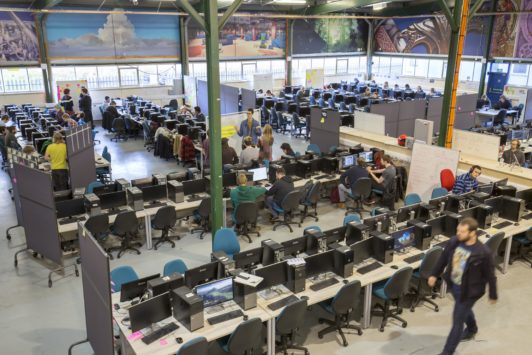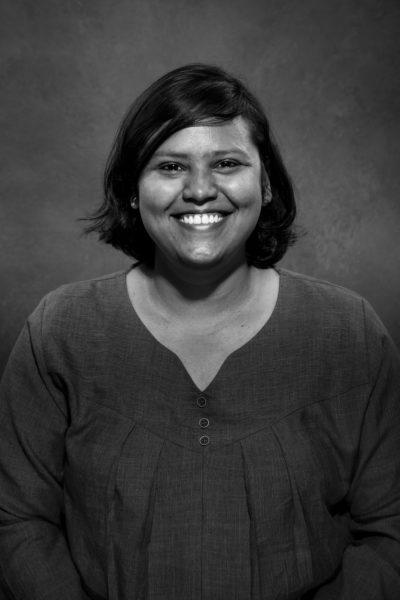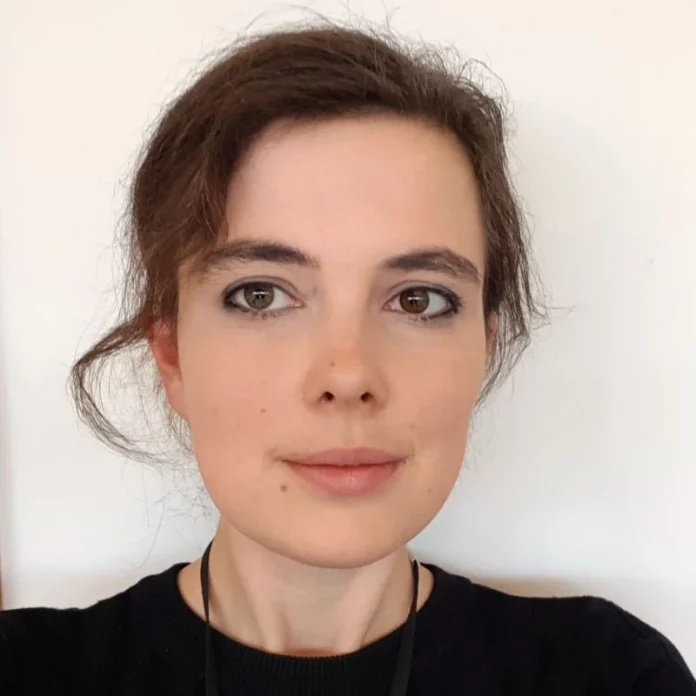With this year’s International Women’s Day focussing on #BreakingtheBias, women from Falmouth University’s tech, gaming and business communities share their insights on discrimination, opportunity, ambition and careers.
Phoebe Herring is a senior lecturer at the Games Academy specialising in Concept Art – the vision images that are used to guide game teams in building environments and characters for games. She also does work inside game engines and on 3D environment art, working freelance in industry as well as teaching. Phoebe has recently worked on promotional concept art for Dota 2 and currently leads environment concepting on an as yet unreleased Unreal 4 sci-fi shooter.
She studied Digital Animation for film/TV but became increasingly interested in game modding and realised that she wanted to work on interactive maps and levels, having always been fascinated with the idea of making a digital world that players can explore.
With data showing that female participation in Gaming and Esports continuing to rise annually, Herring is pleased to see the progress being made in attracting more diverse talent to the industry:
“I’m really pleased to see things changing! Over the course of my time in the industry, the atmosphere has really improved for women in games. Unfortunately, there was some open old-school sexism when I started out. Sadly, we still see some very unpleasant headlines from some companies, but I think the tide is really turning on that sort of outright prejudice.
Nowadays, I think that the barriers are a bit more subtle. Girls have to work around some stereotypes and barriers when getting involved in maths and computing at school and beyond. Then, I often speak to female students who are interested in working in less traditional game genres and aren’t aware of the opportunities there. I think some female students feel nervous about stepping into professional networks that might still feel overwhelmingly male.
Lots of female devs are of course excited to work on classic videogames, but there could be more visibility for young people on the range of other types of game that are out there – non-violent or ‘serious games’, for instance.
The numbers of female students in the Games Academy are a definite indicator of the demographic shifts in our industry in recent years, but there is always more work to be done, especially in the more technical areas. We’re also very aware we have more to do in encouraging racial and ethnic diversity and in reaching out to students from disadvantaged backgrounds – we are actively tackling these disparities by running outreach events to students in other parts of the country and offering mock interviews away from Falmouth and travel bursaries to help people get here and look around our studios when making their choice of course.
If I could give advice to anyone curious about studying or working in Games, I’d say…Go for it! The best piece of advice I can give is probably to embed yourself in networks of other practitioners and embrace our industry’s culture of constructive critique and excellence. If you can find a circle of other aspiring devs, you can all grow your skills together. This is easier than ever with communities on discord and other online social spaces…”

Lucy Stent works as a lecturer at Falmouth’s Games Academy and studies her PhD at Falmouth university. She initially wanted to be a Zookeeper and it was while feeding some otters that she thought about her future career and the things that she was really good at: visual scriptwriting and programming traffic lights using flow charts.
The next day, she started a CHE in IT including maths and robotics, then applied for the Computing for Games course at Falmouth University. After completing her BA and MA programmes, she embarked upon her PhD in Falmouth, too.
Since joining the Games Academy as a student, lecturer and PhD candidate, Stent has been awarded a Women in Games Scholarship at the 2018 Women in Games Conference as well as an award from Google Women Techmakers.
Stent reflects on approaches to attracting more women and girls into Tech and STEM-related subject areas and careers:
“In school I was bullied for not liking make-up or wearing the most fashionable clothes, I was more interested in science and video games. Not to mention my sisters, who are all very successful in careers not thought of as ‘female’ careers so it must be something to do with our parents! In my opinion, the only way to encourage more women into STEM is do discourage superficial activity and encourage curiosity.
“I’m seeing a lot more women within the computing courses but having said that there are a lot more students all together…the best moments in my career are meeting all the new students that come to study computing every year, helping any student that I can…especially figuring out programming problems together.
When it comes to women thinking about taking a step towards a career in games, I’d say the same thing I told myself when I considered going into a career in games: You only live once so try absolutely everything regardless of any assumption of how it will end! I admire any women regardless of age/ knowledge or qualifications that is interested in STEM just like I hope to make women in STEM proud of me…”
Falmouth’s Launchpad cohorts past and present are also playing their part in breaking the bias and celebrating their achievements in the tech start-up space. The new tech company founders are just some of the women here in Cornwall helping to buck the trend and attract fellow female founders into the tech start-up world, where men outnumber women in terms of representation and investment.
Ananya Banerjee, co-founder of wellbeing platform Airize

“As a female entrepreneur, I have made it a point to remind myself – don’t let the bias existing in the world outside become the bias in your mind. This has helped me accept my flaws, celebrate my awesomeness, and be confident. Once I’ve achieved that, I have been welcomed with open arms in the industry because I have created value everywhere I have been to.”
Emily Devonald from Ed-tech female-founded start-up Kevri
“As a three female-founded team, we know that our gender shouldn’t determine our start-up’s worth. However, many businesses fall through the gender gap and lack fair investment. So we hope 2022 is the year when all female founders rise from the fall, break through the bias and get the funding opportunities they deserve!”
Mollie Spurr, founder of charity marketplace Reluv
“My advice to any female founders out there would be to follow your gut and pursue a topic that you’re most passionate about. The world of business and entrepreneurship is not an easy ride, and so, allow your passion to lead your mind, this makes the toughest days of the journey feel like they’re worth it!”
Senior lecturer in business and digital marketing, Vivienne Neale, (Cornwall Business School) has worked as a boutique agency founder, mentor and coach throughout her career, helping women navigate the tech and social media space and helping women find their voice in a male-dominated industry.
Neale is passionate about supporting and preparing future business leaders and marketers, who, she says, are asking penetrating questions about the future of consumerism and the potential for growth without profit.
“Generally speaking, many women are much more confident than in the past, but I think we are still finding our way and experimenting. How can we create business in a way that suits us, rather than fitting in with conventional or patriarchal hegemonies? So much of the traditional language and attitude surrounding business and entrepreneurs is uncomfortable and aggressive. I feel the sustainability agenda is fundamentally changing attitudes and we will see increasing numbers of women from many ethnicities being represented as they feel impassioned to effect change. It’s happening. What we need to encourage is confidence in abilities, perspectives, and self-belief.
Female business leaders have a powerful role to play, without doubt. They create some extraordinary innovations when they step into male-dominated arenas. If you are reading this wondering whether you should set up your own business, I’d say, do it. If a woman in her 50s can throw up everything and start a career from scratch earning a living through her creativity, then anyone can. I always say, Leap and the net WILL appear!”









